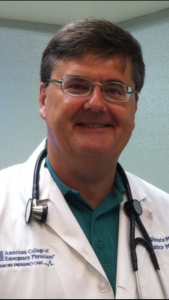ABPS Diplomate Dr. Harry L. Wingate III, MD, FACEP, on the Unique Challenges Emergency Medicine is Facing in Rural America
 As defined by the American College of Emergency Physicians, rural emergency medicine is urgent or emergent medicine practiced in geographic areas with low population densities and resource constraints, including ready access to more specialized care facilities. In rural America, emergency departments provide critical services for their communities but continue to face several challenges, not the least of which is the ongoing shortage of qualified emergency medicine physicians. Rural EDs also have limited access to medical specialists and advanced testing, and their geographic isolation and limited stabilization capabilities can make patient transfer to a tertiary care facility difficult when time is of the essence.
As defined by the American College of Emergency Physicians, rural emergency medicine is urgent or emergent medicine practiced in geographic areas with low population densities and resource constraints, including ready access to more specialized care facilities. In rural America, emergency departments provide critical services for their communities but continue to face several challenges, not the least of which is the ongoing shortage of qualified emergency medicine physicians. Rural EDs also have limited access to medical specialists and advanced testing, and their geographic isolation and limited stabilization capabilities can make patient transfer to a tertiary care facility difficult when time is of the essence.
While rural and urban patients share many of the same lifestyle-related health problems— smoking, obesity, and drug abuse, for example—some issues like snake bites, farming accidents, and a lack of access to primary care physicians are unique to the rural EM setting. In general, urban EMs have a much larger and more skilled support team available to care for patients with complex issues, and the higher volume of such patients provides opportunities for greater skill proficiency in critical procedures.
It’s not hard to understand why there is a shortage of rural emergency physicians. Physicians are predominately trained at tertiary care centers and want to practice in the same or similar type of medical setting. There is also a well-documented pay gap between urban and rural EM ranging from 25% to 50%. Additionally, many emergency physicians are not comfortable working in a “single Doc Shop” that’s geographically isolated and resource-limited.
Still, there is no serious debate whether EM training will make you a better EM physician. Certainly, in the 21st Century, there are plenty of EM residencies that train professionals to meet our urban needs. The challenge comes in finding ways to improve the training and EM skill gap for a shrinking and aging rural emergency physician workforce. The most practical and fastest way to “up your game” in emergency medicine is to pursue certification with the Board of Certification in Emergency Medicine (BCEM), a Member Board of the American Board of Physician Specialties®. Given that the majority of full-time rural emergency physicians are trained in primary care medicine or surgery and that the median age of this group is 58—according to a National Emergency Medicine Workforce Study—they have most likely met the BCEM practice and residency requirements for certification eligibility. The physician benefits of BCEM certification are numerous:
- More confidence in ruling out emergency medical conditions
- More efficient workups
- Better patient outcomes through more decisive decision-making that comes from greater knowledge.
- Better patient education and reassurance
- A greater spirit of professionalism
- More opportunities to take on leadership roles.
Physicians who are currently in a primary care residency and plan to practice in a rural setting should consider adding a 1-year EM fellowship to their training that will allow them to also obtain BCEM certification. Those who are primary care trained and are early in their rural EM career should become familiar with the practice pathway criteria for BCEM certification.
Pursuing BCEM certification is without question the most comprehensive didactic activity primary care-trained emergency physicians can practically accomplish within a year to improve overall EM skills and demonstrate their commitment to providing a high standard of patient care.






